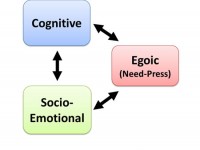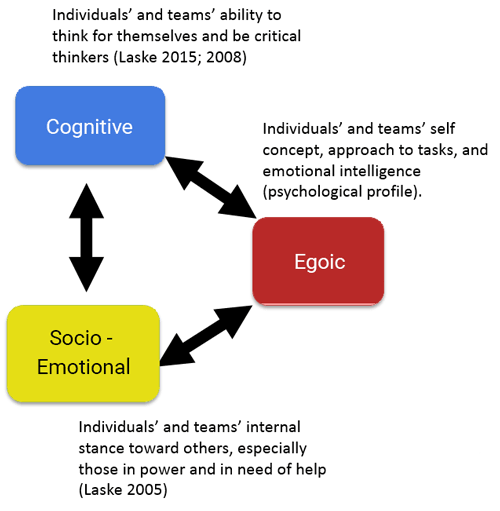Dialectical thinking has a long history of both practice and neglect. In modern times, its renewal was brought about by Roy Bhaskar (1949-2014). His theory of MELD, four degrees or moments of dialectic, not only allowed him to show the flaws of hegelian and the depth of marxian thinking, it also grounded his ARA metaphysics which added to the real world of Meld a layer of ethical and aesthetic depth. The pedagogy of dialectical thinking that is on my mind is strictly one of MELD, thus of the real world seen from a scientific perspective. This pedagogy is based on a very simple connection explored in my work in adult cognitive development and organizational complexity, namely that between Bhaskar's Moments of Dialectic and Basseches' dialectical schemata or, as I say, thought forms (TFs). In my conception, expanding logical thinking by breadth-first search leads to four moments of dialectic, while extending this search into depth leads to an unfolding of moments by dialectic by TFs. This connection of moments of dialectic and associated thought forms is the crux of DTF. Mastering DTF is commensurate which understanding and mastering this connection. The pedagogy I have in mind is therefore based on DTF,... Read More...
Category: meta-thinking
How to Obtain Writings by Otto Laske
Otto Laske's contributions to social-science, process consultation, and the teaching of & mentoring in developmental thinking and listening extend from 1999 to the present day. Many of his articles, keynotes, and teaching materials in English and German, as well as translations into Spanish and Italian, have recently been posted on this website under individual BLOGS as downloadable pdfs. They are organized in the form of thematic collections. These writings are 10 or more years ahead of our time. Licensing of his work is available; so far, it has been adopted in Malaysia. The prominent topics in Laske's writings are: 1. Complex, dialectical, thinking as the peak of adult cognitive development, and its relevance in society today. 2. Pedagogy of dialectical thinking (methodology of learning complex dialog), exercised, taught and certified at the Interdevelopmental Institute, IDM, since 2000. 3. Theory and practice of evidence-based developmental coaching; its missed chances caused by neglecting adult cognitive development in individuals and teams by all those who boarded the social-emotional triumphalism train in the 1990s. 4. Team Coaching framed by Laske's social-emotional team typology (2005) and based on dialectical thought form tools, for unlocking team members' internal dialog (the basis of external team dialog as... Read More...
Foundations of Complex Thinking: What is missing from social media discourse
The papers collected in this blog center around the topic of complex thinking as a hallmark of individual freedom, organizational effectiveness, and societal well-being. They all focus on Lebensbefreiung, the unburdening from needless linear clutter in the mind and the obfuscation of communication. The articles point to, and explicate, a tradition of deep thinking that in the Western tradition began with Plato and survived to the time of Hegel and Heidegger, but through the onslaught of social media and simplistic 'agile' tool kits is presently at risk of being disavowed and forgotten, not only in education, but in training and management. The research reported in these papers is based on DTF, the Dialectical Thought Form Framework (Laske 1999, 2008, 2015, see publications at https://interdevelopmentals.org/publications/). DTF is a synthesis and refinement of work done by Basseches (1984), Bhaskar (1993), and Jaques (1994). It was born of the need to gain a comprehensive concept of adult development that has gone missing in the work of Loevinger, Kegan, and other 'developmental' researchers and their followers (like Wilber) by one-sidedly focusing on social-emotional, not also cognitive, development. By contrast, DTF transcends meaning-making toward sense-making both of which are needed to understand adult development in... Read More...
Zur Durchdringung organisatorischer Beratung mit Einsichten aus CDF
In diesem Artikel fuehre ich im Einzelnen die Geschichte und die Eigenart des Constructive Developmental Framework (CDF) aus. Ich moechte zeigen wie insbesondere ein soziologischer Beratungsansatz wie New Deal (Gucher 2015), aber auch aehnliche Beratungsvorgehen, durch Einsicht in die lebenslange Entwicklung von Menschen vertieft und im Dialog mit Kunden flexibel werden koennen. Der Nachdruck im Text liegt darauf, dass alle Dimensionen von Sozialkapital -- persoenliche Beziehungen, Emotionen, Aufmerksamkeit und Wissen -- in ihrer Bestehensweise und Verwendung entschieden von dem Reifegrad von Individuen und Teams abhaengen. Dies legt nahe, die auf New Deal beruhenden Interventionen durch sozial-emotionale und kognitive Werkzeuge aus CDF zu bereichern und dadurch zu staerken. Insbesondere erhoeht man durch CDF die Dialogfaehigkeit von Gruppen und Teams und staerkt das fuer eine kollaborative Arbeitsweise notwendige gegenseitige Vertrauen. Der Artikel behandelt sowohl wie man CDF durch Gruppenarbeit am Interdevelopmental Institute erlernt und wie man das erlangte Wissen in Kundenberatung und Coaching einfuehren kann. Anfragen ueber Lehrweise und Kosten der CDF Ausbildung zur dialogischen Beratung bitte an Otto Laske, otto@interdevelopmentals.org, richten. Durchdringung des New Deal mit CDF Feb. 2018 Read More...
Introduction to “Dynamic Collaboration: How to Strengthen Self-Organization and Collaborative Intelligence in Teams” (Jan De Visch & Otto Laske 2018)
This blog gives readers access to the Introduction to Jan DeVisch's and my book entitled Dynamic Collaboration: How to strengthen self organization and collaborative intelligence in teams, to be launched in May 2018 at the University of Antwerp, Belgium. In this book of five chapters, we deviate from the extant team literature by adopting an adult-developmental perspective and instead of "skills", "competences", and "agile" mantras and tool kits focus on the structure and quality of team dialog as the source of self-organization both in individuals and teams. We equate self-organization with being mature enough to be aware of the structure of one's emotions and thoughts as an expression of the level of one's adult development. To provide senior managers with new ways of thinking about teams and new kinds of interventions derived therefrom, we show that teams are always developmentally mixed -- composed of different developmental levels -- and dependent upon how team majority relates to team minority, are prone to being either up- or downwardly divided, rather than unified. We put at the disposition of senior managers a large set of tools unknown to them that derive from adult-developmental research at Harvard's Kohlberg School since 1975, showing them how... Read More...
New Dialog Methods for Broad-Spectrum Systems Constellations: Comments on the Milano Workshop on Intelligenza Collaborativa Nel Team
As shown at and, on this website, at , a workshop on new dialog methods specifically for creating collaborative intelligence in teams will take place in Milano, Italy, on January 30-31,2018. The workshop is offered by Consulenza Evolutiva, Milano and its Altroove School, and staffed by Lorenzo Campese, Alessandro Rossi, and Otto Laske. The workshop is a pioneering first in that it introduces Broad-Spectrum Systems Constellations which broaden the focus of attention of conventional constellations as detailed in the attached pdf. The workshop is held both in Italian and English. Those interested in signing up for the workshop with Consulenza Evolutiva will find further details on the workshop process below. Broad-Spectrum Systems Constellations Read More...


